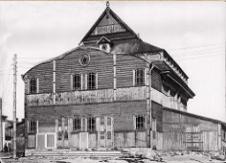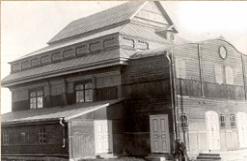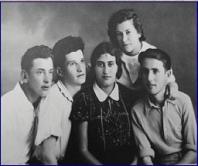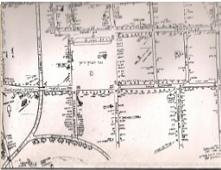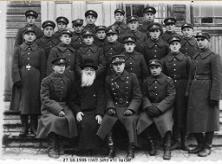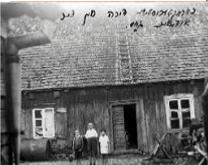VILKAVISKIS
A small town in Southern Lithuania
Where the Jewish Community is no more
Growing Up Under Russian Rule 1815 - 1914 Part 9
RELATIONSHIP BETWEEN JEWS AND NON-JEWS
Jews drew their living mainly from the non-Jewish country folks and the Jewish merchant would buy produce from the non-Jewish farmer. ―Generally speaking, they got along fine. [during this period]. Lithuania was mainly an agrarian economy. Russian laws excluded Jews from farming. The Lithuanian farmers produced the farm products and the Jews were traders, shopkeepers, craftsman, and so on. So Jews and non-Jews had a lot of dealings and contact with each other. There were informal bonds of common humanity bounded by geography and interdependence of trade and habits. The Jewish young folks sang both Russian and Jewish folk song
.
POLITICAL ACTIVITIES
After Russia lost the Russo-Japanese War of 1905, a revolutionary wave hit Russia. Widespread dissatisfaction among the Russian populace surfaced. Labor strikes all over Russia echoed in the town. Although the town was considered a pious Jewish community, traditions weakened. Revolutionary activities excited the Jewish youth, and atheistic thoughts, doubts, and confusion spread quickly. The brutality of the Russian Tsar and pogroms contributed to the attractiveness of Socialism.
Socialism in Action:
Socialism and the principles of Karl Marx‘s revolutionary doctrine spread like wildfire. The slogan ―Religion is the opium of the people was taken literally by some boys and girls. Even yeshive bokherim were missionaries for the socialistic ideal. Socialism represented the hopes of the poor people in Eastern Europe and some adherents to the new doctrine were also tate-mames kinder [parents‘ dependent children] who depended on their burzhuazi [bourgeois] parents for maintenance. The first week of May 1905 marked a fervent time for the revolutionaries. People dissatisfied with tsarist policies waged a revolution throughout the country. Revolutionary songs were in vogue, and there were protest strikes as well as frequent clashes between demonstrators and the Russian Army. Proclamations flooded the community calling for citizens to overthrow the ruling Tsarist government. Revolutionaries called for a democratic republic and an eight-hour workday. Handbills were pasted on walls throughout the town, calling for a manifestatsye [demonstration] as well as a night march. There were also several shpayzkelers [food storage cellars], which were convenient for meetings while the parents enjoyed their Saturday afternoon naps.
Revolutionary Parties:
Factories and big businesses existed in Villkaviskis . The town had a large working class and the proletarians consisted of workers in men‘s and women‘s tailor shops, a bookbindery, and other industries mainly operated by family members. Some of these workers joined one of several competing revolutionary parties: mainly the Zionist and the Bund (a Jewish Socialist party). There was also a Zionist-Socialists group whose program was to organize a Jewish republic in Palestine based on socialist principles. Each of these groups was organized by the inteligentsye [students of the men‘s and women‘s advanced schools]. They demanded freedom of speech and assembly, a parliament and the abolition of the tyrannical Russian Tsar. The strikers demanded that family run stores as well as other shops not to open before 8 am and close not later than 4 pm. Both Jews and non-Jews shared this concern and were members of the revolutionary parties.
Teenage Rebellion:
Young people, still in their teens, gave vent to their rebellious energy in secret deeds, such as smoking and swimming in the nearby lake on the Sabbath, eating treyf [non-kosher food], and other such irreverent acts. One story tells of a group of teens holding a revolutionary meeting on Yom Kippur [the Day of Atonement] while their parents piously prayed in the synagogue. The hot debates stirred a ravishing hunger, and one teen went to look for food and discovered in the kitchen the opfastn [meal to break the fast]. Without the knowledge or consent of the hosts who permitted the meeting to be held in their family‘s home, some of the teens ate all the fish and meat that had been prepared for the family to break the Yom Kippur fast. When the parents returned from synagogue after fasting all day, the wife discovered to her horror that the pots and pans were empty. She sensed the guilt of her children, but wanting to protect them, she declared to her husband that the food was stolen. The family broke the fast with the untouched eggs and milk, which fortunately the young revolutionaries had overlooked.
Police Response:
The sight of a suspicious Russian stroznik [police guard] near the family home caused parental apprehension. Surprise searches were held when a member of the family, such as a young daughter, was seen wearing a long red blouse, the socialist uniform, or a young man wearing long hair. The police looked for forbidden revolutionary literature, such as books and pamphlets that were printed underground or smuggled in from Germany. The punishment for possessing this forbidden literature was a stiff jail sentence or even banishment to frozen Siberia. However, Jewish youth were eager readers, and they hid the censored literature in their homes or kept it in outhouses. (Indoor plumbing did not yet exist.) When parents discovered such caches, they disposed of them quickly by burning. Tearful scenes and hot arguments between mother and son ensued when the son discovered that his cherished collection of pictures, books, and manifestos had been destroyed.
Misinterpretation of Socialism:
It was explained how Marxist theories, on one hand, purported a fair and just government and equality for all, but on the other hand, how this equality was often achieved at the expense of Jews: ―While some of our statskinikes [Jewish idealists] may not have understood completely the Marxian theories, yet their approach towards it was of a much finer nature than that of some non-Jews. To some of the latter, Marxism represented a process of equalization of personal property, especially Jewish property. This gave the non-Jewish underworld permission to take other people‘s possessions by any means possible, fair or foul, even through stealing. Often on market days the presence of so many visiting farmers drew to Villkaviskis some questionable persons. A speaker would suddenly mount on an empty herring barrel and deliver a speech: "Let‘s demand that all barns and homes, especially those belonging to Jews be left unlocked so that there may be freedom for all to take what rightfully belongs to all the people. Down with the shtroznik, the dogs who watch our every move." After such a speech some Jewish barns were broken into and horses stolen.
RUSSIAN REVOLUTION
Economic, political, and social chaos existed from 1918 to 1921 during the Russian Civil War. This conflict pitted the Communist Red Army against their opponents, the White Army, which included monarchists, constitutional democrats (the Kadet Party), and the socialist revolutionaries, predominately the peasant party. Each of the forces vied for political power. Officers representing one of the Russian factions periodically came through Vilkaviskis to conscript young men into the army. Leaders of the Jewish community were responsible for filling the recruitment quotas. This led to corruption on the part of local authorities who could be bribed to reduce the quota. When parents were alerted that a Russian recruiter was coming to town to draft men for military service, often a father, then of age, hid under the lid of a well until the army officer left. If a draft dodger was caught, he or his family was required to pay the high fine of 300 rubles. The informer who identified the man shared this fine with the government.
